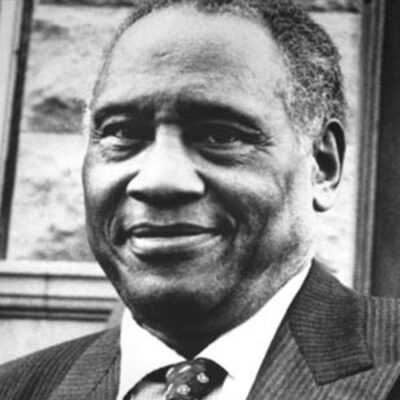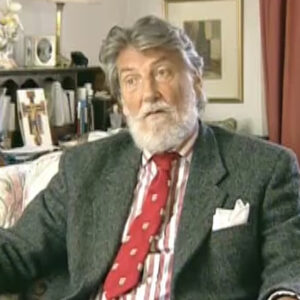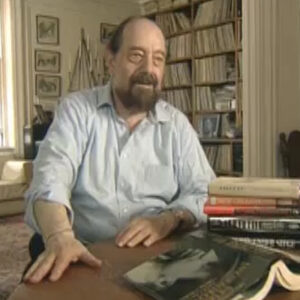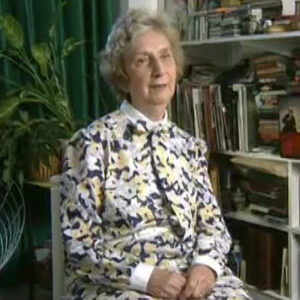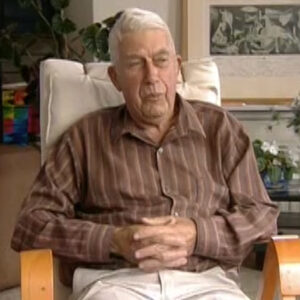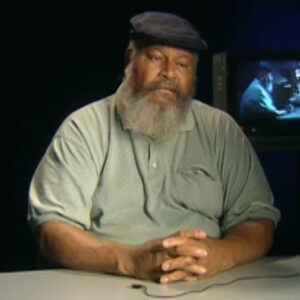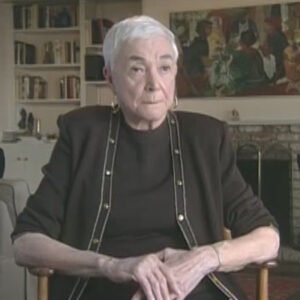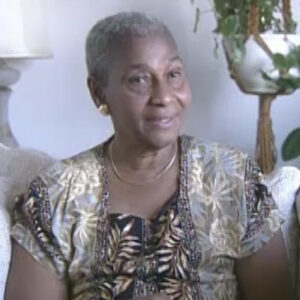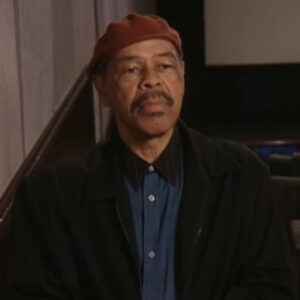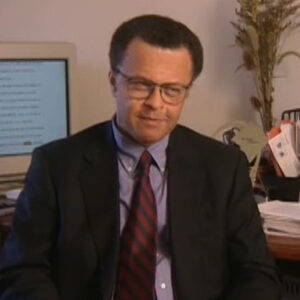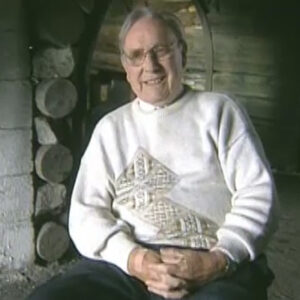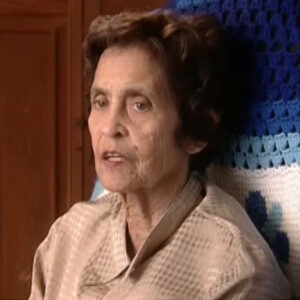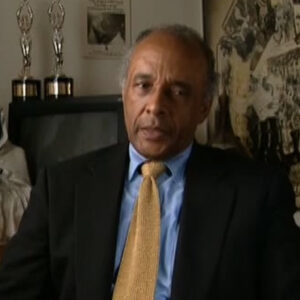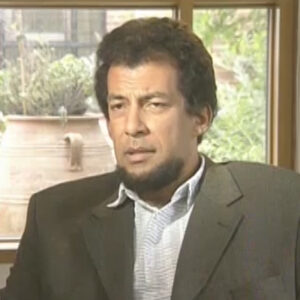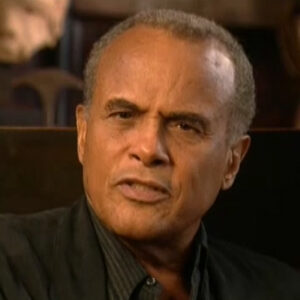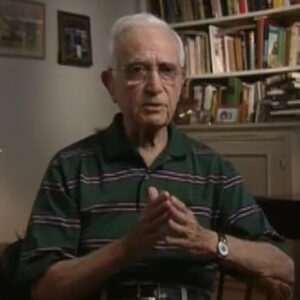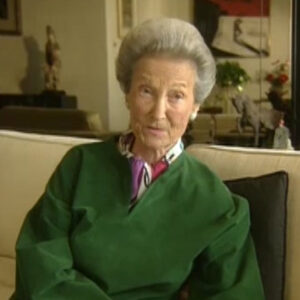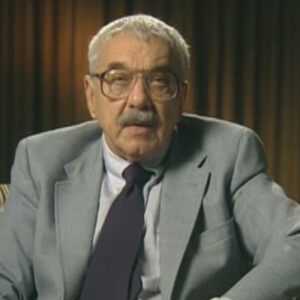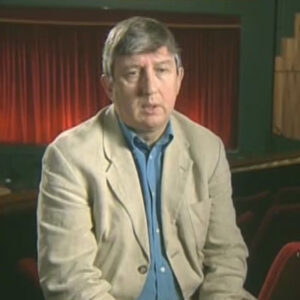Speaker Yes, yes, no.
Speaker Well, first of all, tell me the first time you met Paul Robeson, just well, as I was saying, I first met Robeson in Chicago. I was starring in a play called A Young American. I was the young American. And it was produced by the Shubert’s. And it was a big party given for us, for the cast. And he came to the party and he was invited by Margaret Burroughs.
Speaker And it was a wonderful experience for me because I had always been, you know, in all Paul Robeson as my God here here is this man, you know, appearing at this play that I was in.
Speaker And I you know, it was just overwhelming experience.
Speaker I actually, particularly since I have been following him as a performer, as an actor, you know, as a singer and so on.
Speaker So I remember I think the first time I saw him was in Sanders of the Rivers, and I was a kid, 130 Fifth Street and 7th Avenue running around, you know, I think to the Renaissance Theater or one of the not the Apollo.
Speaker It was the Harlem Opera House, perhaps.
Speaker And we saw him, saw this majestic figure, loved it. He was singing. And it was it was just absolutely mind boggling for us because he was so regal and and so proud.
Speaker And we we felt terrific. I’m speaking all my friends, and we we used to sing the song that he sang and so on.
Speaker So that was my first encounter, shall we say.
Speaker Was he a pop star in Harlem? I mean, in a sense, was he like a noble guy or was he like a popular.
Speaker Oh, yeah, I think I think and, you know, Robeson was the man I mean, as far as the the acting community was concerned, he was the Pathfinder.
Speaker I mean, he was charting new directions. He was establishing a different persona for the African-American on the screen. And a number of performers began to act as began to take their cues. And performers and generals, singers and so on began to take their cues from Robinson’s lead because his you know, he has a he has a statement he had a statement to the Negro artists, The Negro artist must either fight for freedom or slavery.
Speaker And that he had made his choice and and if you look at his performances, his performances are double consciousness performances.
Speaker That is to say, they on the one hand, they are intrinsically and organically bonafide acting performances, performances.
Speaker But there are also performances that are conceptualized in such a way that the person watching them comes away from the performance with a feeling of that, you know, that people of color have dignity.
Speaker People of color are human beings.
Speaker People of color are not the stereotypical denigrated people that Hollywood is so anxious to, you know, to to produce so that his his I mean, of course, it’s a function of his intellect, a brilliant man. And he could operate on these two tracks, these to this double consciousness that Dubois talks about the. But it’s a different kind of double consciousness, I guess it’s a Robeson double consciousness in that.
Speaker Yeah. His performance always had that other agenda, you know, working how how to deliver it.
Speaker How delivered. Do you think that that’s a good concept? Yeah. How delivered do you think it was?
Speaker Oh, I think I think it was I think he he thought this through. I mean, he knew what he was doing. I remember that’s another performance a second time. I really had a marvelous experience watching him was in North ELO. I saw the original production of it, not the original one of the the Margaret Webster production I saw. And I’ll never forget, you know, we were all we were sitting in the audience waiting for his entrance. And when he came in with this this marvelous presence in this voice and and this this majestic persona, it was thrilling. I mean, it was the audience just gasped.
Speaker It was very I thought powerful performance.
Speaker Now you teach acting. So when you saw him, how would you rate as an actor in terms of craft and craft persona? Yeah. Did he have the chops in terms of craft?
Speaker Yes, I think he did. As a matter of fact, it’s kind of interesting. I was just looking at body and soul because, you know, last night and this morning and it was terribly interesting to see the nuances of personality that he was delineating way back at that time.
Speaker Yeah, OK, so, yeah, I was saying that it was interesting to see the nuances and subtleties in his performance as the preacher, as was as Isaiah Jenkins, when you think back in terms of the time in which that film was made, which was in 1923 or for somewhere around there, the quality of the acting at that period, during that period was very stiff, very stylized.
Speaker And of course, his performance had elements of that.
Speaker But it also had these other elements that I’m talking about, which were very spontaneous and engrossing. I mean, you you couldn’t take your eyes off of him and, you know, he was a star. I mean, you realize that he was a star and that you could follow his mental mechanisms, his mind and his mental and emotional mechanisms.
Speaker You could follow them much more easily than you could with other actors in that in the particular sequences that he was playing.
Speaker So he came out of a staged environment onto the screen. It was his first production. And usually what happens in that situation is that a stage stage actors tend to over modulate the image. They tend to be over active. And their their their behavior is very broad.
Speaker Now, his behavior was broad, certainly because of the constraint of sound. That is to say, there was no sound on his. You know, it’s a silent movie. So one had to do a certain amount of of pantomime, if you will, to get over a particular idea of particular feeling and so on.
Speaker So he did overact from time to time. But basically you you were taken in by his character of the preacher who Jack like preacher.
Speaker And then also you were convinced that he was this very nice guy, you know, Sylvester, you know, which is wonderful. And it was kind of amusing in a way. It’s a kind of a how can I say this?
Speaker It was campy. I mean, today, looking at the performance, it was campy. I mean I mean, the whole it was a camp on the one hand.
Speaker And yet it had a very serious social statement that it was making, you know, very interesting indictment of not only the type of preacher that came through and exploited black people at that time, but of the wider society.
Speaker I mean, it was America is famous for its hypocrisy, and he delineated that very well. And it made you think of other areas in life went beyond the black community, you know, that had this hypocritical thing going on.
Speaker I mean, and I’m sure that he wasn’t his intention or of course, it’s machol now. We’re talking about his intention was not to to indict the black church. His his intention was to indict those individuals who were exploiting the beliefs and the faith that black people traditionally have in religious matters.
Speaker When when he made an effort to pump the play back, it’s starting to jump. Oh, for him to be free to. Thank you.
Speaker I just want to let you know if I no, I mean, when could you compare his acting as you saw him in a silent yes to when he began to have talkies because he had such a great voice?
Speaker Yeah, yeah, yeah, yeah.
Speaker And the talkies, I think that Robeson’s voice was a very important, how can I say impressive voice. And there was no way that you could escape the voice. But I think that he he did moderate it. I mean, it was not it was not it not overacting voice. Not to me anyway. I mean, I thought that it was part of the particular persona that he was projecting. The he played a preacher and tales of Manhattan, which I saw.
Speaker And that was that was very larger than life performance. But everybody was larger than life. I mean, they were directed to be I mean, and you have to keep in mind that a lot of the times the the directors of black actors.
Speaker Encouraged a certain kind of overacting, at least it seemed to me I because they intended to convey a kind of, how can I say a caricature of of of a human being.
Speaker And so I. I don’t recall. I mean, let’s see. I’m just trying to think of robots in films that that.
Speaker Might be less, you know, overacting, shall we say.
Speaker And he did a film, the Welsh film, what’s called Valley. I thought that was a pretty nice performance, you know, and it was. That wasn’t overacting. No, no. That’s what I’m saying. It was it was a very simple and even in even in body and soul. Sylvester, if you look at Sylvester, the performance of Sylvester in contradistinction to the performance of Isaiah Jenkins, Reverend Isaiah Jenkins there you had his playing in the character of Sylvester.
Speaker Very easy, very low key, very I mean, he could do that. And he also with the preacher, the Jack, like the preacher Jenkins, he he wanted to make a statement about that kind of person person, that kind of character. And he, Bertolt Brecht, calls it the alienation effect. I mean, he he he sort of did the performance and then he did he said this. He points to the performance as he does the performance. I don’t know if I’m making myself clear. I mean, in other words, he it’s almost a satire.
Speaker Not quite. It’s more of a commentary, a social commentary on that type of personality which he was performing.
Speaker Yeah, the. It seems to me that the fact that all the baggage that Robeson had to carry exactly.
Speaker You got it right. I mean, it’s he had this is that double consciousness thing. I mean, that he a double agenda.
Speaker I mean, that is to say that he knew that he one was a very important person. He knew that he was important to people of color, to the African-Americans, people of color worldwide. He knew that he was important to America in terms of of raising the consciousness of white America and the rest of the non colored world.
Speaker And he felt that it was important that he helped to achieve this through his art. I mean, if he had been a producer, he would have produced the productions of the kind that would do achieve that objective. But he uses art to to to his art of acting to to do that.
Speaker And did you ever hear of any comment that Robeson made about Michelle Obama and the comment that Michelle made about Wilson?
Speaker I never heard of any, you know, no, I never did.
Speaker But I thought it was fascinating that Michelle, you know, gave him his break and as, you know, as a screen actor and that he I thought it was interesting that he didn’t do any further work with Michelle, but I think that he probably went out of Michelle’s price range, you know what I mean?
Speaker Because Michelle was doing these films on the cheap, you know, and they were I mean, it’s so interesting because Michelle and Robeson were really, in a way, not unlike each other, in the sense that they both understood American society. They understood the rape of our culture, the rape of our persona, the rape of our resources as laborers and so on that America was perpetrating during that period of American history.
Speaker And they, at various times and places of their own choosing made their indicting. They made indictments, you know, of American society. And it’s kind of interesting that they came together at that moment. And that’s a good that’s a good comment that I’m.
Speaker Today, if you’re frozen, I’m just trying to place them in context.
Speaker I mean, is there anybody who approaches that or, you know, how do you think you would have fared today if you tried to be in the movies now?
Speaker I don’t know, you know, basically Hollywood is getting sillier and sillier, you know, to begin with, and I would think that he would be kind of turned off by even more so today than he was before. I mean, every now and again, Hollywood does come out with an interesting production that has, you know, value and social value and commends itself culturally and so on. But by and large, a lot of the stuff that comes out of Hollywood is very silly. I mean, as a matter of fact, you know, Roseanne was really ticked off with Hollywood by the time we got to Tales of Manhattan. And he he did he made a couple of very important speeches. I don’t know whether you were aware of this, but about Hollywood, because he had become disenchanted, because they would the producers would tell him that they were going to do this and do that, or if he asked to have a particular position, more dignified rendition of this character on the screen, he would say, well, he would say that the producer would tell.
Speaker Well, you know, the South wouldn’t approve of this, you know, and they were constantly blaming the American South for their racism, for their east produces racism, you know, which is a slick move. But the fact of the matter is that the South was in them, you know, much more than the south was in the south. And it it I think it was always a cheap shot at this at the south, you know, in order to keep their relationship with him on a good footing, you know.
Speaker And so, I mean, basically, you’re saying he wouldn’t have. He wouldn’t.
Speaker I don’t think there’s anybody that can compare with him, if that’s what you mean. I can’t think you know, I think Sidney comes close to Elvis.
Speaker And I think more than any other actor, I think in terms of his commitment to playing roles that in one way or another confer a degree of dignity on people of color. I think certainly comes the closest to that, you know. OK, I should say, Sidney Poitier, but see, um.
Speaker I think when you were growing up in Harlem, you know, was this was. I asked this before, OK, when you were growing up, what was how popular was Robeson in terms of everyday life? Not the intellectuals, not the writer that you know, but I.
Speaker Well, I think the thing that made Rosen attractive to people was his concern for people, you know, I mean, his his interest in people is interested in the black experience, his interest in African history. I mean, this was a person with a global view of reality, you know, and he took the black community to that level with him, you know what I mean? And they appreciated it. I mean, we every everybody appreciated that he you know, he was opening up these vistas with his talent, with his singing, with the choice of his songs. He would sing a song in one language and sing it and another and another. I mean, he was opening up the world to the black community, you know, for the black community.
Speaker And I think that that was appreciated additional to his being a theatrical star or just a concert singer, you know, so he they weren’t there.
Speaker Not that many who have that have had that impact, I don’t think in the long run. Right. All this film where, you know, you think that he won the battle. In other words, he was trying to raise the level of portrayal. Sure. Yeah. You know, ultimately he quit. Cheryl, do you think that he won or do you think he just sort of gave up?
Speaker Well, I think I think he won in the sense that he had managed to alter the perception that had helped to alter the perception that people had of black people, that black people had of themselves. He helped to alter that perception.
Speaker And in that sense, he won. I mean, you can’t win the entire battle because there are forces at work that are pretty profound. They’re very serious hostile forces. They’re like, you know, the height of winter, you know, for the flowering that people’s spirits want to have. So these forces are constantly at work. They have become more subtle, a more circuitous, more devious. And so it’s difficult to say that he won, you know, in that sense. But he won a great deal of ground.
Speaker He achieved a great deal of of.
Speaker Success for people of color and certainly the acting community, the black acting community. I mean, he was our leader, you know, I mean, in terms of of a black actor functioning on the stage with screen, I mean, he he was someone that we sort of, you know, looked to Canada, Lee, Sidney Poitier, Belafonte, all of us, Jimmy Edwards, Dotts, Johnson. I mean, we all looked to Canada and Ossie Davis I looked to to Robinson because Robinson was he was the man, you know, um.
Speaker What I’m concerned about was that he seemed to be all alone.
Speaker No, I mean, not that people weren’t with him, but I mean at key points either culturally and even politically. Just politically. Yeah, they kind of, like, backed off.
Speaker Yeah.
Speaker Well, we, of course, will be the you know, America was a very tricky place to live in during that whole McCarthy period. I mean, you know, people talk about Soviet Union and how this and how oppressive it was. I mean, I was pretty oppressive period for people who who loved the Bill of Rights, who loved human rights, who loved the American Constitution and the Declaration of Independence. I mean, these people were under attack.
Speaker And Robertson loved the Bill of Rights. He loved the Constitution.
Speaker He loved I mean, he loved the human rights of people and the dignity of people. And he wasn’t willing to compromise on it. And so he took a lot of beatings that other people who. Didn’t feel that they could confront in the end as a direct a way as he did, I mean, he had you know, he had the balls to correct to confront this thing, you know, and he wasn’t going to be intimidated. And, you know, it was that in itself was a very strong decision that he took.
Speaker And and so other people took similar a similar position, but they were penalized even, you know, I wouldn’t say worse than he was because he he his passport was taken away from him.
Speaker And, you know, they closed out his concert tours and all of that, but he prevailed ultimately.
Speaker Well, if you seen all his films.
Speaker No, I have not. What would you say is some of the best moments of I mean, somebody said, show me a good example of what?
Speaker Oh, I hate to say this because but I think it’s got to be standards of the rivers and Othello.
Speaker I mean, those are my two favorite Savina.
Speaker And the Sun is a rose only because as a young kid, I mean, it blew me away. I just thought he was like Cat’s meow, you know, I was just taken in by it.
Speaker And and then when I saw Othello, I mean, it was a very powerful performance. And, you know, I but I have to tell you, I thoroughly enjoyed body and soul, you know, I mean, looking at the body and soul. And it’s so interesting about body and soul. It’s a it’s it.
Speaker Even though it was done in 1920, what was it, 1922, 23, something like, I don’t know.
Speaker But anyway, by insole, if you were to play in black churches today, if it were to play in the black community today, people would identify the basic thesis of that film and the basic thesis of Robinson’s performance. I mean, it’s indestructible.
Speaker I mean, it’s it’s clear it’s an indictment of this type of of unscrupulous individual who preys on people because of their, you know, position, a lower position, destitution and so on.
Speaker So you think that transcends it, transcends the performance, transcends and so does the picture actually. Ultimately. I mean, you know, it’s not a Hollywood picture.
Speaker It had a sense of practically falling over if you touch them, you know, the redundancy of the scene using the same sets over and over again, all of those things suggests a very low budget film.
Speaker But having said that, the the the intention of the filmmaker and the intention of the of the artist playing the role is indestructible. You know, I mean, it’s and and and the quality of the work in both instances because of that intention is very strong. It’s very strong, even though it’s not a high budget film. So it really achieves what it set out to achieve.
Speaker You know, just just by way of context, could you talk about what it was like to be an independent producer now? You know what it was? What was it like? You know, I mean, you don’t know, you know, historically, you know. So what was it like? Tell us about how what was it like to be an independent producer then and not did it?
Speaker I don’t know. I understand. Well, I think, you know, I think my show was extraordinary because my show really people talk about independent producers today.
Speaker But he really was probably the first independent producer, black or white. I mean, they were. And also the black cinema was the first area in which independent production took place.
Speaker I mean, a lot of white independent producers aren’t even aware of this.
Speaker They’re not aware that the independent producing trend or development took place within the black community because we had to develop a parallel cinema to what was going on out of Hollywood. And that led to a lot of self-reliance. And the master of self reliance was asking me.
Speaker So, I mean, he he not only rolls his films, scripts and then, you know, produced raise the money and directed them and then went off on to distribute them from time to time himself. So that and he was a survivor. I mean, you know, I mean, the body and soul is a case in point. I mean, they didn’t want to allow his film to get into the theaters, the board of censors.
Speaker And they they they, you know, turned it down and then he cut it down to five reels from nine, really cuts it down to five reels.
Speaker He gets it into the theater, you know, gets it’s a wedge.
Speaker You know, you get the words going there and opens up the door with a crowbar with five five real film.
Speaker And then he comes in with an eight reel production subsequently because he had already established I mean, he was a street fighter. He was a marvelous tactician and strategist and guerrilla fighter. And in the tradition of real independent production. And I think that that, you know, just studying his life on that level is, you know, textbook case of how an independent producer survives.
Speaker So, um, I’m sorry.
Speaker I feel, you know, let’s talk a little about your relationship with Paul. You’ve known him for a long time.
Speaker Yeah, well, Paul, I met Paul Junior at the Harlem YMCA.
Speaker It’s now called the Jackie Robinson Alliance or something like that. Well, I used to go there all the time because I was a member of a club called the Panthers. We played, but it wasn’t the Political Panthers, it was the Basketball Panthers. And we we played basketball. And then I swam and I did pottery on the wheel. And it was an art study with Ernie Critchlow, as a matter of fact, at the Harlem YMCA. And then I was always in the gym and into the gym. I remember the time came this young kid my age and and they said he was Paul and son.
Speaker And so something had you seen?
Speaker I hadn’t seen Sanders at that point, but I knew the name, you know. But anyway, Paul Jr. and I used to wrestle at the at the Y and then one.
Speaker Well, I don’t know. I don’t know who I know. I was a boxer and if he had boxed me, I would have won probably at that time.
Speaker But but he I didn’t I didn’t see him for quite a while after. And then we became friends later on when we grew up. So but then of course, as you know, we’ve done a number of productions together.
Speaker I mean, we we did two spectaculars on his father’s. Birthday and one at Carnegie Hall, the other one at the Shubert Theatre, and we also tried to do a feature film on his father’s life and ran into a number of the problems that his father ran into when trying to get financing for for production.
Speaker You know, just the last question, but. When I when I say I’m doing a flower pot roast and when I mention it, everybody says, boy, he was a great man. What a tragedy. So what I’m trying to figure out, what do they mean, do you think they mean it was a tragedy?
Speaker Well, you know, it was well, it was Christ, the tragedy was going be a tragedy.
Speaker We’re all, you know, as Voltaire was I mean, Voltaire or Socrates.
Speaker I mean, there are these human beings who come down the pike, you know, who are intent on altering the nature of the cosmos as it relates to the human experience.
Speaker And they do things. They do things which are there to the benefit of humanity, decades and centuries to come. That’s what these people are. Is that a tragedy? I don’t think so. You know.
Speaker You know, I don’t I really don’t. I mean, what do you think they mean, because you didn’t make it?
Speaker You know, but you see, the problem is that we’re trying to equate Paul Robeson in Hollywood terms or in American. You know, you’ve made it because you’ve got a million dollars or ten million dollars or, you know, 40 billion like Bill Gates. You know, that’s not a he’s not a tragedy. Bill Gates. It’s a tragedy. And in certain respects, I mean, it’s so it’s a Donald Trump. And so a lot of these people, I mean, they’re walking tragedies compared to their significance to the human race in the decades and centuries to come. I mean, people will look back and say, what? He had all that money and he didn’t do this and he didn’t do that. What he had, he built these buildings and he didn’t build any schools for kids. I mean, who is this person? I mean, that’s the tragedy. I think.
Speaker I mean, Robeson is no tragedy. I mean, he’s a blessing. And so a lot of other people who sacrifice, you know, on behalf of humanity.
Speaker OK, you know, I’m saying that, you know, that might be a role, but. No, I’m saying that, you know, Ted Turner finally broke through.
Speaker In consciousness into what it was that he should be doing with his money, you know, besides putting in a bank or buying a whole lot of real estate in Argentina and, you know, and Western and so on, he took his money and he put it where it should be go. It should go into the United Nations. It should go into any institution or international or otherwise that it’s trying to raise the level of human existence. That’s where the money should go and not in some stupid CD, CD or some mutual fund. I mean, this is a it’s a shame that that that level of intelligence is not at work with these supposedly intelligent people.
Speaker But when you did you did you know anything about FC?
Speaker The only thing the only thing I well, you know, I knew of her, but, you know, managing.
Speaker Yeah, no, clearly. I mean, clearly she was, you know, one of the powers behind the throne. I mean, if not the major power, I mean that she was an extraordinarily intelligent woman and she watched his back, you know, as best she could. And she did a very good job with it, apparently, because the two of them were kind of a binary star system in a way, you know, and that they he she helped him do his thinking.
Speaker I mean, I’m not taking anything away from him, but I’m sure that that he had many, many reasons to discuss with her key moves that he would make in his life and his career and so on.
Speaker And, you know, she’s probably one of the unsung heroes, heroines or whatever you call her, of the Robinson experience.
Speaker And she also could have been a control freak because that’s one of the things he ran away from.
Speaker Well, you know, listen, you know, everybody wants to be free, you know.
Speaker You know, everybody wants to have their own identity and they want to own it all by themselves, that it’s a childish aspiration in one sense. And yet it’s very cosmic.
Speaker It’s a it’s a it’s a natural, normal human tendency. But, you know, how can I say this? But responsibility and accountability to another person is ultimately a highest level of of an operation that a person can get into.
Speaker I mean, it’s the it’s the it’s the area of consciousness that I think that that you have to get to if you’re going to be successful, as you would say, you know, in life, you know, to be grateful to someone for what they’re doing for you, even though it’s painful, even though you don’t like anything that they say. But they are helping you, you know, because they’re standing out there and see what she was standing up. She was watching him. She was watching the audience. She was watching the the industry and how it related to him that she was she was his alter ego for quite a protracted period of time.
Speaker He didn’t seem to learn that lesson. I mean, how do you mean? Well, because even up to the time that they were into the time she died, there was all this friction between him. And it was always this I mean, you know, the path and coming back together.
Speaker But a lot of people live apart and come back together.
Speaker I mean, you know what, you know, particularly in today’s you know, you live together with whoever you are. I mean, I you know, they live.
Speaker I know, but but, you know, this is this is this is Bill Clinton, Hillary Hillary Clinton time. You know, I mean, it’s the ad hominem argument. It’s the it’s the how can I say it’s the it’s for the National Enquirer.
Speaker And I mean I mean, it’s the kind of thing that they would be most concerned about is whether or not Paul Robeson as enrollers and lived together or didn’t live together or agreed or didn’t agree.
Speaker I mean, that’s that’s that’s you know, it’s dirty laundry time work or any of those at home in type, you know, perception. I think that that’s irrelevant.
Speaker I think the relevant thing is that S.E., with that, without S.E., I’m not sure that Paul Robeson would have emerged, you know, and I mean, that’s the bottom line. And for that, you know, everybody is grateful and including Paul Robeson. I’m sure, you know, in the bottom line, when he makes up the calculations of, you know, the pluses and minuses, it has to be that with her there he made it, you know, because you you need at least two brains to deal with this monstrous in an environment.
Speaker This this is the Hollywood industry, the the the theatre industry. I mean, you know, you need with a career, you need you need more than one mind deployed and solving these problems. And there are many of them, you know.
Speaker So, you know, I think there’s some room to.
Speaker I you know that it’s the. Well, this is going to.
Speaker In the wrong town, there’s one, there’s one. Yeah, OK.
Speaker You would talk about success and people with money and how they you know, whether or not they have an impact on the scale of Roseland.
Speaker And I think also Cosby comes close to this. You know, he he comes close to it in two ways in terms of the kinds of productions that he’s tried to do in terms of it being. A blow for freedom, a blow for dignity, a blow, I mean, that he that he really tried to and tries to to foster that whole area. And then also on the financial side, Cosby is he has no peer within the black community in terms of his fostering very positive developments in the community. You know, and I think that attention should be paid to that, you know, and, uh, you know, I guess representative pretty much with his heart.
Speaker Yes. Well, he Robinson was not a wealthy man. I mean, because of the fact that he was very selective, first of all, in the kinds of things that he I mean, he could have been far. He could have been you know, he could have made millions and millions of dollars. I mean, had he, quote, sold out to the forces of vilification, I mean, the people who wanted to denigrate people of color and so on. And I mean, he could have been, you know, Mantan Moreland or Rochester and I don’t know, he could have made a lot of money doing a lot of silly things. And he routinely turned those things down so that, you know, in a sense, one takes the vow of poverty in a way. I mean, on a relative level.
Speaker I mean, he always had money, more money than the average performer, singer, actor and so on, but not the amount of money that he could have made. I mean, and he he he turned his back on that kind of money. And I think that, you know, some people would call that a tragedy, you know, I don’t think so. I think it’s a mark of, you know, a real sainthood in that sense that someone would would do that.
Speaker You know, one thing I didn’t ask for this. He I mean, what training did that? The the what training that, you know, what do.
Speaker Well, I mean, I really don’t know.
Speaker I mean, I knew he knew Sergio Eisenstein and I know that he I think he met Stanislavski and discussed with him. I think that he you know, he was inveterate student. I mean, he was quite a student. And I’m sure that he studied a lot of acting performances and derived his is his his expertise as an actor from some of those, you know, experiences. But I formal studies, I don’t know. I’m not aware that he studied with a particular, let’s say, acting instructor. And for that matter, you know, you could say that.
Speaker Neither do you know. Neither did you up in that. Neither did Charlie Chaplin.
Speaker I mean, you know, I don’t I don’t know that you can you can really pigeonhole him in terms of who he studied with, you know.
Speaker So when so when people say that he was an original, I mean, that might actually be the case.
Speaker Yeah, I mean I mean, who did John Wayne study with? You know, who did the.
Speaker Gary Cooper, we know that Marlon Brando studied with Stella Adler and Lee Strasberg and Kazan, even though Marlon might not agree that he studied with them, but he was always in the classes that I was in. You know, but but he he it’s true that he did do a lot of studying with Stella Adler.
Speaker But, you know, Marlon represents a new wave in acting and theater and so on.
Speaker That one doesn’t associate with Robeson and some of the people of that period that was there, the actors that, you know, once they looked at Wilson, that he set off a kind of a rogue Sony.
Speaker Oh, yes. So, yes, I mean, listen, I mean, James Earl Jones has this persona.
Speaker And then there was Jones’s father, who had this very deep. And then there’s Avery Brooks. And now you have a number of these actors who are using this deep voice. I mean, and it’s a very engaging quality. I mean, it’s a very exciting theatrical quality.
Speaker And sure that people imitated him all over the place.

